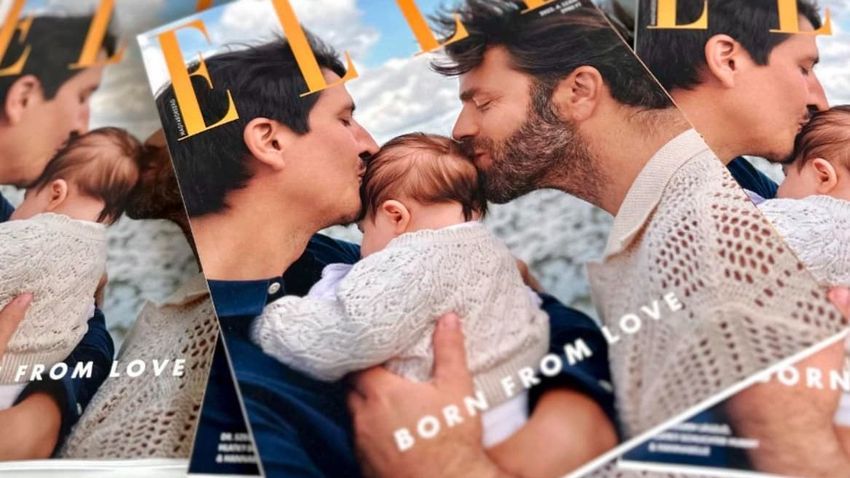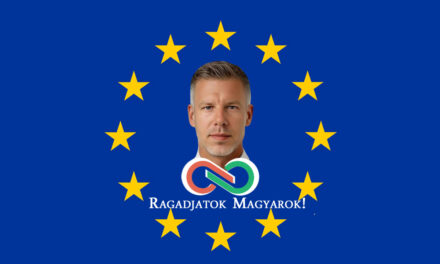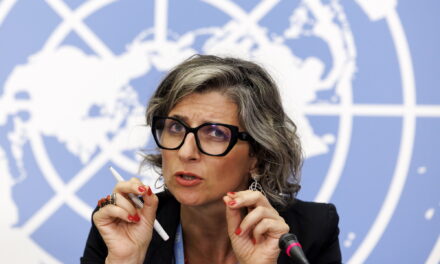It happens that two people with capital, even of the same sex, pay a sum of money out of love, in exchange for which they get a child in a state where this is possible through surrogacy. Written by Francesca Rivafinoli.
"Gays are more accepting of the child's health status and origin", "Should a Roma girl grow up in an institution instead of being with a loving homosexual couple??" "If they can't adopt him, the poor man will end up abroad!" - these kinds of sentences come up every time there is a question about the right to exist of two-father or two-mother communities.
In this case, the exemplary altruistic gays on the one hand and the evil pseudo-Christians on the other hand, who would let the overage orphans perish in an orphanage only for the sake of it, stand out.
The question is how does it fit into this narrative when two Hungarian men pose with a white baby brought from California on the cover of a magazine, with the motto "Born from love" in English.
May God keep the baby alive for a long time in physical and mental health. If a child is born, then - as we also know from Péter Márki-Zay - it will definitely be born by a woman, with the effective contribution of one (1) father. If, moreover, it is specifically "born out of love", and in accordance with the UN Convention on the Rights of the Child, we have the child's best interests in mind, then the Western world should obviously find some kind of way so that the mother and father who love each other and him can raise him, or is it absolutely necessary in this case, a married couple from the neighborhood will take him in and not have to end up with strangers living on another continent, and as a result, be torn from his roots several times and grow up.
If we've learned so far that adoption abroad is bad, why should we suddenly celebrate the same in the case of a child for whom every local couple on the waiting list would rush with both hands?
If we consider it contrary to the interests of the child that an older brother and sister from Borsod will eventually be raised by a childless Italian woman and her husband, then the
why should it be elevated to a pedestal as a wonderful example of love, if two Hungarian men transplant an American baby "born of love" from the birthing room to Scandinavia?
Let them do it if they see it as good, but how does a story like this - as ELLE writes - provide a "handhold" for those who feel left out? Now that they see the picture, well, they too buy a few plane tickets to California (in this case the climate panic can be discreetly put to rest), rent a cool house in Sweden and already have a beautiful little girl? Isn't this all an example of how much money can solve?
At a time when, according to Katalin Cseh, "nine-tenths of the country sighs when, say, they have to buy meat in the store", would it really be revolutionary and historic if the baby project of a member of the "high society" is on the cover of an expensive magazine?
But this is still the best and cheapest, classic adoption route; however, we know that
the love from which a child is born can burn not only between the biological mother and the biological father, but also between two persons with capital, even of the same sex,
who, out of love, pay a sum in exchange for having a child in a state where this is possible through surrogacy - say, Ukraine or California, where the dear client wishes. If by chance this were the case (I wouldn't be interested in it, if it wasn't based on a spectacular "value-centered" campaign), then we would understand even less what the women's(!) magazine ELLE wants to "inspire and encourage" with its campaign .
Is it for men to use a woman's body for their own purposes? In order to rejoice over the fulfillment of men's desires, and not to be aware of the lucrative industry operating in the background (born from lóvé)?
Is it for a little girl to become a commodity subject to sale and purchase during the months of her fetal life, and then, due to the premeditated intention of adults, to live her whole life without a mother? If we claim that a gay man replaces the mother and the symbiosis with her, before and after birth, do we not degrade the woman into a birthing machine, who has such a meaningful function in the story that she carries the child, but from then on her role is irrelevant?
In such cases, of course, the argument comes that "there are so many alcoholic or neglectful mothers: let's be happy if someone grows up with loving men instead!". It's a great suggestion, but for some reason it always comes up when there is no such abuser on the horizon, near or far, against whom the particular drop should be protected. If I were to say that, in general, a baby is in a much better place with a balanced, caring, loving heterosexual couple than with two passive-aggressive homosexuals on anti-depressants, then I would be homophobic because of the grossly skewed comparison, wouldn't I?
Only because then we confirm that everyone who distorts in the opposite direction is heterophobic.
If we see homosexuals on the front page holding a minor who has been abused and is not taken in by other adopters, we can open this debate, until then there is no basis.
In the case of surrogacy, it is especially false to refer to negligent heterosexual mothers - since this kind of business generates emotional neglect because the woman using her womb for business purposes will not develop the same attachment to an order to be delivered as to her own, freely loved children; but even the potential biological father does not get along with the given fetus until its birth. According to the editor-in-chief of ELLE, the cover "proves the undeniable truth that the family is not about biology, but about bonds" - if this were an undeniable truth, there would still be a key word, the bond, which should not be neglected even in the fetal age.
But besides, it is not clear what would be undeniable about it. If it was such a subjective thing, that it was either biology or a bond, then why is it a basic rule in adoption that the little one must know about the fact of adoption from the beginning, i.e., in addition to his current bonds, also his biological origin? In the event of a parent's death, why does a descendant who has not been validly disowned, but who has not been seen for decades, receive an obligatory share?
A law is currently being drafted in California that will change the definition of infertility to include all homosexual couples;
in the future, insurers will have to finance the use of surrogate mother services by homosexuals in the same way as the use of surrogacy services combined with egg donation by a heterosexual couple - it is too late to complain about this: as soon as a society believes that "the family is not about biology, but about bonds" , passing such legislation is the most logical step possible.
The only problem is that according to the relevant UN convention, the child has the right to "know his parents as far as possible and to be raised by them"; on the other hand, there is no known international convention on adult rights that would state that this right and the best interest of the child can be relegated to the background depending on the family-founding opportunities of the adult (of any orientation). On the contrary: Unicef's 2022 information clearly points out that there is a risk of multiple human rights violations in the case of children born through surrogacy (especially international surrogacy programs).
So, until it becomes clear that there is no such thing in the case presented by ELLE as a "positive scenario", everyone should reserve the right to be at least skeptical of the entire #BornFromLove campaign.
Because if that's why the flag of homophobia goes off, then it's an ugly dictatorship.













